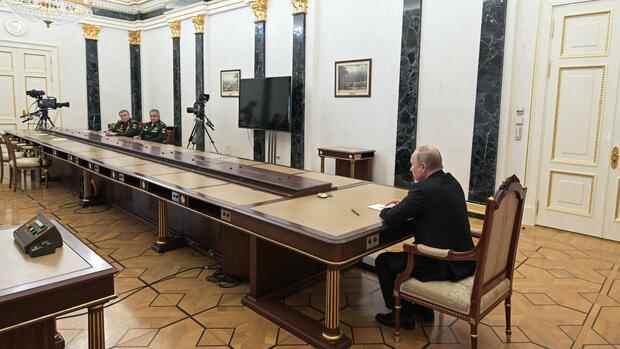Moscow Russian President Vladimir Putin has ordered the nuclear power’s deterrent weapons to be put on special alert. Putin ordered this on Sunday in a video distributed by the Kremlin. He spoke of “deterrent weapons”, not explicitly of “nuclear weapons”.
“As you can see, Western countries are taking unfriendly measures against our country not only in economic terms,” Putin said on state TV. “I mean the illegal sanctions, which everyone knows very well.” In addition, top representatives of the leading NATO countries also allowed themselves “aggressive statements towards our country”.
The US, Japan and the EU want to exclude certain Russian banks from the Swift payment system. In addition, there should be other sanctions against Russia.
He instructed Defense Minister Sergei Shoigu and the chief of staff to place the nuclear deterrent in a “special regime” of combat readiness, he said at a meeting with his top advisers on Sunday. His order means that Russian nuclear weapons are put on increased readiness for launch. In the past few days, Putin had already threatened terrible consequences if a country intervened directly in the Ukraine conflict.
Top jobs of the day
Find the best jobs now and
be notified by email.
NATO is worried
NATO Secretary General Jens Stoltenberg was initially concerned about Putin’s decision. “It shows how serious the situation is and why we really have to stand together (…)” he said in a BBC interview on Sunday.
He told the CNN TV channel that Putin’s statements were “dangerous rhetoric”. You are now confronted with a “new normal” for your own safety.
“The top figures of the leading NATO countries allow aggressive statements against our country, so I order the Minister of Defense and the Chief of the General Staff to put the forces of deterrence of the Russian army into a special regime of alert.”
(Photo: via REUTERS)
He initially gave no information on a possible reaction by NATO to Putin’s announcement. According to information from the alliance, there are no automatisms for such a case. NATO decisions must be made by consensus among all 30 member states. The NATO nuclear powers USA, France and Great Britain could already react.
The American ambassador to the UN, Linda Thomas-Greenfield, said live on a US news program on CBS that Putin was escalating the war in a completely unacceptable manner. This must be condemned in the strongest possible way.
The US government says that NATO has never threatened Russia. The fact that President Vladimir Putin has now put the nuclear forces on alert follows a pattern, says spokeswoman for the President’s Office in Washington, Jen Psaki. Putin constructs dangers that do not exist in order to justify Russian aggression. “We will counter that,” says Psaki. “We have the ability to defend ourselves.”
Sipri does not anticipate the use of nuclear weapons
Federal Defense Minister Christine Lambrecht said in relation to the overall situation: “We have no concrete evidence that Putin actually attacks a NATO member or NATO countries,” says the SPD politician on ARD. But you have to be prepared. In addition, the people in the Baltic States are concerned.
In the Phoenix news channel, the FDP security politician Marie-Agnes Strack-Zimmermann interpreted Putin’s order to put the deterrence forces on increased alert as a sign that the Russian President is obviously “completely surprised” by the unity of NATO and the EU.
Ukraine, in turn, sees Putin’s announcement as an attempt to “exert additional pressure on the Ukrainian delegation,” Ukrainian Foreign Minister Dmitro Kuleba told journalists on Sunday. He was referring to negotiations between Russia and Ukraine, which were due to start on Sunday. “But we will not give in to this pressure.”
After Putin’s speech, the Stockholm peace research institute Sipri stated that it did not expect the Ukraine war to lead to the use of nuclear weapons. “I don’t think nuclear war is a likely consequence of this crisis,” said Sipri Director Dan Smith of the German Press Agency in Scandinavia. “If nuclear weapons exist, then unfortunately there is always this small possibility. And that would be catastrophic.”
This is how the Handelsblatt reports on the developments in the Ukraine war:
In Moscow and other Russian cities, even before Putin’s video message was broadcast on television, people took to the streets against the Russian invasion of Ukraine. After the speech, the protests intensified. Demonstrators shouted “No to war!”.
A protester with placards, the one on the left reads “No war”.
(Photo: Reuters)
The anti-war protests began on Thursday after Russian troops invaded Ukraine. Hundreds of demonstrators have been arrested every day since then. Sunday’s protests appear smaller than Thursday’s, when thousands rallied in Moscow and St. Petersburg. However, the true extent was difficult to assess.
In St. Petersburg, where dozens gathered in the city center, police officers grabbed one after the other and dragged them into police vehicles – although the demonstration was peaceful and there were no clashes. Human rights group OWD Info, which monitors the protests, said as of Sunday afternoon there had been at least 356 arrests at anti-war rallies in 32 Russian cities.
More: Anonymous hacks Gazprom and Ministry of Defense websites
